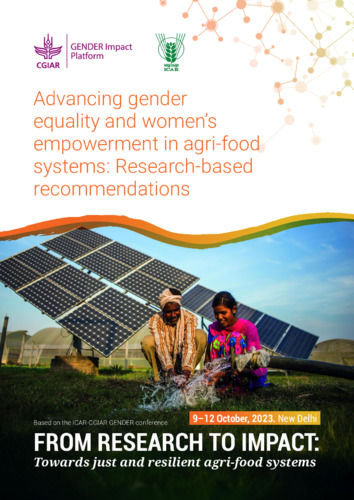Advancing gender equality and women's empowerment in agri-food systems: Research-based recommendations
Abstract
Midway to the endpoint of Agenda 2030, ambitions of achieving gender equality and empowering all women and girls (Sustainable Development Goal (SDG) 5) remain a distant reality. The polycrises of COVID-19, climate and conflict have not only halted
but also, in many contexts, reversed progress towards gender equality. Unequal gender and social relations undermine the mitigation of and responses to these and future crises in agri-food systems, and hinder the resilience of rural people and landscapes. The Food and Agriculture Organization’s (FAO) report The status of women in agri-food systems (2023) estimates that closing the gender gap in farm productivity and the wage gap would increase global GDP by 1%, reducing global food insecurity by about 2%, and the number of food- insecure people by about 45 million. Yet current estimates indicate that at the current rate of progress, it will take nearly 300 years to achieve gender equality globally.
In South Asia, more than 71% of working women are engaged in agri-food systems, many of them in informal settings. Women produce between 68–80% of the food in most developing countries and are responsible for half the world’s food production. Despite their crucial role and significance in agri-food systems, women’s contributions remain invisible. They continue to face structural inequalities, such as a lack of access to and control over land and other productive resources; limited access to information, capacity building, and credit; and restrictive social norms, including heavy care responsibilities.
From 9–12 October 2023, the Indian Council of Agricultural Research (ICAR) partnered with the CGIAR GENDER Impact Platform to convene an international research conference “From research to impact: Towards just and resilient agri-food systems”. The conference, held in New Delhi, promoted the sharing of cutting-edge knowledge on gender and inclusion in agri-food systems to help bridge the gap between research and practice and foster gender-equal and socially inclusive and resilient food systems. The event brought together thought leaders from renowned academic and research institutes, National Agricultural Research and Education Systems (NARES), non-governmental organizations (NGOs), civil society organizations (CSOs), donors, policymakers and the private sector from 52 countries to deliberate on innovations and solutions that can contribute to achieving just and resilient agri-food systems.

